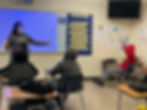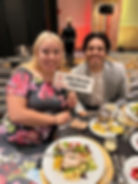Noticing Neighbors Latinx Education Collaborative
- Hayley Finch
- Nov 26, 2022
- 10 min read

Heart, Home and Humanity are the three pillars driving the Latinx Education Collaborative, and in one conversation with Edgar Palacios it’s easy to see how true that is.
This organization provides support to retain and increase the representation of Latinx teachers in grades K-12 by creating platforms that uplift their voices. This holistic support allows the Latinx teachers at the center of their community to feel uplifted while they inspire their students.
I got the chance to sit down with Edgar Palacios and learn the story behind the LEC team.

Hayley: You know what, I see your LinkedIn posts and it is so encouraging to follow your work. Can you share with our readers about the Latinx Education Collaborative and what you all do?
Edgar:
Yeah, so I'll just give you a quick rundown. I run two organizations, they're sister organizations. So one is the Latinx Education Collaborative and its mission is to increase the representation of Latinx educators in grades K-12. Then we’ve also got RevED, for short, and its purpose is to build power within the Latino community around the issues of education. Hayley:
That sounds like it works well together. Edgar: I see them as two halves of a whole. One is really around the pragmatic side of things, like how are we doing this work collaboratively? How are we doing this work in a way that inspires the future? On the other side, it's more of a political process, right? Like, there are policies that need to shift in order for representation to truly occur. There are things that we need to hold people accountable for. So it's a full strategy around how we effectively increase representation in K-12 for Latinos. I try to think of all the different ways that I can add context to that, and showing why that's important to me. Hayley:
Why is this important to you? Edgar:
I was born in Miami, Florida. My parents are immigrants. They came to this country in 1981 from Nicaragua, fleeing a civil war. So the first 10 or 11 years of my life I spent in Miami, and it was great. I was surrounded by other Latinos from different countries. Miami is really cosmopolitan in a lot of ways. I was also exposed to people from around the world, and so diversity was naturally embedded in Miami, right? I didn't have to feel ashamed of speaking Spanish at school. Like some of my teachers spoke Spanish every once in a while. It was easy in a lot of ways. Then when we moved to Spokane, Washington, in the middle of 6th grade, I immediately understood that I was different in a lot of ways. Hayley: What did that look like? What made you think that? Edgar: My first day in 6th grade is part of my story and why this work is so important. It's like, I walked into the classroom, I was nervous, and excited to start off 6th grade. Then before I even got to my seat, the young lady who I was going to sit next to was like, “I don't want to sit next to a dirty Mexican.” Hayley:
First day! First thing?
Edgar:
Right? And thus began my introduction into how this country can be discriminatory, how racism plays a part in the history and in the work.
Then later I went to high school in Cape Town in Missouri, which is 2 hours south of St. Louis. Spokane was a huge town compared to Cape. And yeah, I had some rough times there too, but it really drives the work. It’s all about this idea of: What does it mean to belong? What does it mean to not be overlooked? What does it mean not to be dismissed? What does it mean to have your voice heard, and really thinking about what if I’d had Latino teachers along the way that could help me navigate those systems?

I'm curious what my own outcomes would have been like, and what my own experiences would have been like. So that's at the core of why I think this work is important. In Kansas City, only 1% of teachers are Latino, and that's roughly 260 teachers across the greater Kansas City metro area. Compare that to 50,000 plus Latino students.
Hayley:
It just doesn’t match. Edgar: There's a huge disparity there, and the gap is what we need to address. Research demonstrates that when students see themselves reflected by the teachers that serve them, they just have better educational outcomes and experiences. And actually, every student has better outcomes and experiences when they're exposed to diverse teachers and a diverse teaching population as well. In Kansas City, our Latino community is growing exponentially and quickly. We've seen that happen in schools, and so we just want to make sure that we have folks in place that can help our children navigate the systems and ultimately be successful.
Hayley:
Wow, I didn't know that you had that time in Miami. I think there's something really interesting about how you got to see, when this is modeled correctly, what an impact it had on you.
Edgar:
I love that you picked up on that, because I don't know if a lot of people pick up on that part of it.
Hayley:
Right.
Edgar:
It's a foundational experience for me, right? I know what that integrated system looks like and feels like because I was a part of that.
Not that Miami was perfect in a lot of ways, but still from the social component, there were a lot less issues. I also think about, like, what if I hadn't been born in Miami? What if I had been born directly into Spokane or Cape Town? I would have had that experience from the very beginning. What would my outcomes ultimately be?

So I'm really grateful for my time in Miami because it helps inform the fact that, no, this is possible. We just have to prep for it, right? We just have to do the work to get to that place.
Hayley:
So when you are talking about encouraging Latino teachers to stay in the profession, how are you all helping that part of it?
Edgar:
Yeah, absolutely. So our work is centered around three pillars. We call them heart, home, and humanity. Retention is critical in this work. First and foremost, we want to make sure that the folks who are currently in the system stick around in the system, and that they're having positive experiences as educators.
Hayley:
Sure.
Edgar:
We know that one of the top reasons that Latino teachers leave the profession is isolation. Something that's named consistently throughout anecdotal evidence and research is this idea that they're the only ones.
So that becomes really difficult for folks, right? What we want to do is build community. We want to build a home where educators feel less isolated, more supported and loved. We want them to know that they are appreciated. We want them to know that they are critical to the success of our students.
Building community is at the center of our work. Making sure that folks know that they have a place to go, and that they see themselves as part of a bigger kind of effort versus just isolated in their own classroom, is so important.

Hayley: There’s a pressure that comes with being the only one of anything, too. It could also feel isolating in that way. Edgar: If you happen to be Latino and bilingual, then you typically become the ‘Chief Latino Officer’ of the school. Which means you're navigating extra jobs in addition to regular teacher duties, which are already difficult. You're providing all the translating, the interpreting, the communication with the parents and all this other stuff, right?
Hayley:
So everyone’s coming to you because you are the central resource for that. That often goes uncompensated? Edgar: Right. Hayley:
So since it’s unofficial, it's allowed kind of slide under the door of: well, you're the only person, and somebody has to do it.
Edgar:
I think most teachers will do that because that's why they got into education. I think you hear time and time again from our teachers that they're in the profession because they didn't see anyone that looked like them.
Hayley:
Sure.
Edgar:
So for them, it was important that they found a way to help make the system better. But that gets taxing over a while. People can only do that for so long without feeling frustrated and whatnot.

So that's what we're trying to do on our side of things. Our hard work is really around inspiring the hearts of our Latino students and encouraging them to become educators one day. We believe that the earlier we start tapping on their shoulders and saying, hey, you should consider becoming a teacher, the more likely it is they consider becoming a teacher. But we also want to be honest with you. We want to talk about the challenges of what it means to become a teacher, what the challenges are currently, but also say also remind them that it's a critical profession. Teachers are the glue that holds communities together. And so how do you get into a profession that does that, right? How do you teach the future of our community as well? We want to create a sturdy sense of belonging for our teachers. Hayley:
It feels like a very focused effort. Edgar:
The reason that we focus on that work is particularly for teachers of color. If you're having an issue with retaining teachers of color, these are black and brown folks who sometimes have the ability to choose to exit the work—but I see them as leading indicators.
Hayley:
How’s that?
Edgar:
If you're a teacher of color and you leave a building because you don't feel included, or you feel like there's issues there, then what does that do to your students of color? What does that mean for students who may not have the same level of agency and choice? I think a healthy ecosystem includes teachers of color who are thriving and find themselves in a space where they feel like they have agency and autonomy and they belong.

It's all interrelated, and I see it as a cycle. If you have a teacher who's excited and part of our community, that teacher then can also inspire other students to become teachers one day, and they can also help build a supportive culture.
Hayley:
I'm curious—it can be on either side, the teacher side, or the student side—do you have any specific memories where you saw something click for someone and they got a different level of support than they're used to?
Edgar:
I see that work happen literally every day. It’s happened more as I've been able to grow our team. We hear stories from our educators, right? And actually, we also hear stories from our students. The most meaningful one for me was when I was part of a scholarship committee for one of our partners, The Learning Club. There was a young lady who we were interviewing for the scholarship, and she starts talking about the LEC!

Not knowing that I'm there, and not knowing that I'm a part of this committee, she's talking about how the importance of this made her apply for the scholarship because it made her want to become a teacher, because for the first time she felt seen, she felt heard. She felt committed to this work, and she was so excited about it.
Hayley:
What! And you get to hear this!
Edgar:
Right. Anytime that I feel down and out about this work, anytime that I feel worn out as an entrepreneur in the nonprofit space from constantly talking about this, I remember that story, and I'm like: you know what? There's so many stories out there that we don't even get to hear, right? So we have trust and faith that that's happening, particularly when we're doing this work from a place of integrity and authenticity. That was the cool reminder, and that's a moment that I connect back to often.

Hayley:
There’s so many connections that, like you said, are happening when you're not there. I mean, I'm sure so many of them are happening day to day in classrooms. Ripple effects that you've had, is work that you don't see, and that's so selfless.
Edgar:
Teachers are like that too. I'll just say that I think we have to remind educators about the fact that sometimes you don't see the fruit of your investment until many years later.
Hayley:
Right.
Edgar:
So allow us to remind you earlier than that of why you're important in this space, right? That way you can stick around ten years later and have the student walk back in your classroom and say, “You made a difference in my life.” I think that's important too.
Hayley:
That’s such a great point.

This last question is broad, so you can take it wherever you want! In your position with this team, how have you seen goodness? Have you seen positivity?
Edgar:
Yeah, no, I mean, I think positivity exists everywhere, right? I think, for one, that we have to acknowledge the times are difficult. The times have always been difficult in a lot of ways.
Hayley:
Right.
Edgar:
I think some experiences that we see elevated we're more aware of, but I think that they exist continuously.
The positivity exists in the fact that teachers are resilient. Teachers are selfless in a lot of ways. Teachers teach, right? And at the end of the day, you tend to become a teacher because you care about kids, right? You tend to get into the profession because you want to serve and help future generations grow, so you want to build those connections. You want to be a guiding light for folks.
With teaching, particularly for those who are called to teach and knew from day one that they're going to be teachers, it's cool to see them in action! It's cool to see kids connect to them, and it's cool to see kids see opportunities because of their connection to educators. That's a lot of positivity. And I’ve got to say, no matter the context, if you go into a classroom: you are going to see brilliance and genius from the students.

Hayley: Yes!
Edgar:
It may not always look in the way that you expect it to look, but we’ve got really intelligent young people out there who are already doing things that I would never even dream of doing at that age, so I get to see that. Not every day, but I'm going into a school in about 20 minutes, and I think I'm going to see that again! You see these incredibly thoughtful, generous people—and sometimes these young folks have fire in them. It hasn't been tapped into yet in a lot of ways, and they're assertive. So it's cool to be around that energy, because ultimately it informs the work, and to me, encouraging that fire is what we have to do as adults. Just being older, in a lot of ways it’s not that we know better. But we do have more access and privilege, so let’s make sure that light and that energy students have continues to thrive.

Keep up with the latest with Latinx Education Collaborative through their website and Instagram. All media originally published by Latinx Education Collaborative via their online platforms.



























